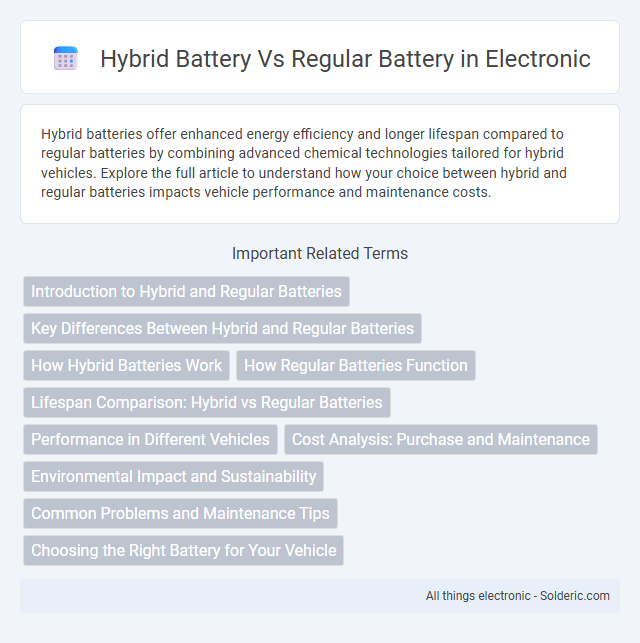Hybrid batteries offer enhanced energy efficiency and longer lifespan compared to regular batteries by combining advanced chemical technologies tailored for hybrid vehicles. Explore the full article to understand how your choice between hybrid and regular batteries impacts vehicle performance and maintenance costs.
Comparison Table
| Feature | Hybrid Battery | Regular Battery |
|---|---|---|
| Purpose | Power electric motor in hybrid vehicles | Start engine and power accessories in conventional vehicles |
| Composition | Nickel-metal hydride (NiMH) or Lithium-ion (Li-ion) | Lead-acid |
| Capacity | High energy density for electric propulsion | Lower capacity, focused on cranking power |
| Voltage | High voltage (100V to 300V typically) | 12V standard |
| Lifespan | 8-10 years or 100,000+ miles | 3-5 years or 30,000-50,000 miles |
| Maintenance | Minimal, sealed units | Periodic electrolyte checks and replacements |
| Cost | Higher initial cost | Lower initial cost |
| Environmental impact | More eco-friendly with recyclable materials | Contains toxic lead and acid |
Introduction to Hybrid and Regular Batteries
Hybrid batteries combine a high-voltage battery pack with a conventional internal combustion engine, optimizing fuel efficiency and reducing emissions in hybrid vehicles. Regular batteries, typically lead-acid or lithium-ion variants, serve primarily as a power source for starting engines and running electrical systems in traditional vehicles. The distinct design and functionality of hybrid batteries enable energy regeneration and storage, unlike regular batteries which solely provide short-term power supply.
Key Differences Between Hybrid and Regular Batteries
Hybrid batteries use lithium-ion or nickel-metal hydride technology to provide higher energy density and longer lifespan compared to regular lead-acid batteries commonly found in standard vehicles. Hybrid batteries support regenerative braking systems, enhancing fuel efficiency and reducing emissions, while regular batteries primarily supply starting power and run electrical accessories. You should consider hybrid batteries for their superior durability, environmental benefits, and ability to maintain consistent performance under varied driving conditions.
How Hybrid Batteries Work
Hybrid batteries combine the capabilities of traditional lead-acid batteries and advanced lithium-ion technology to efficiently store and deliver energy for hybrid vehicles. These batteries use regenerative braking to convert kinetic energy into electrical energy, which is then stored and utilized to power the electric motor, reducing fuel consumption and emissions. The integration of multiple cells manages voltage and temperature to enhance durability and performance compared to regular car batteries.
How Regular Batteries Function
Regular batteries function by converting chemical energy into electrical energy through electrochemical reactions occurring between the anode and cathode, generating a steady flow of electrons. These batteries store a fixed amount of energy and require replacement or recharging once depleted, lacking the regenerative capabilities found in hybrid batteries. Common types include alkaline, lithium-ion, and lead-acid batteries, each designed for specific applications based on energy density, discharge rate, and lifespan.
Lifespan Comparison: Hybrid vs Regular Batteries
Hybrid batteries typically offer a longer lifespan than regular batteries due to their advanced chemistry and thermal management systems, often lasting between 8 to 10 years or 100,000 to 150,000 miles. Regular batteries, such as lead-acid types used in conventional vehicles, usually last around 3 to 5 years or 30,000 to 50,000 miles before requiring replacement. The extended durability of hybrid batteries results from their design to handle frequent charge and discharge cycles efficiently, reducing degradation over time.
Performance in Different Vehicles
Hybrid batteries deliver superior energy efficiency and regenerative braking benefits in hybrid vehicles, enhancing fuel economy and reducing emissions. Regular batteries, while effective at providing consistent power in conventional vehicles, lack the advanced energy management systems necessary for optimized performance in hybrids. Your choice between these batteries should consider vehicle type, as hybrid batteries are engineered for complex power demands, unlike standard batteries designed for straightforward engine starting and accessory support.
Cost Analysis: Purchase and Maintenance
Hybrid batteries generally have a higher upfront purchase cost compared to regular lead-acid batteries due to advanced lithium-ion technology and complex battery management systems. Maintenance expenses for hybrid batteries are typically lower over time because of longer lifespans and regenerative charging, which reduces wear and tear. Regular batteries require more frequent replacements and maintenance, increasing total ownership costs despite their lower initial price.
Environmental Impact and Sustainability
Hybrid batteries significantly reduce environmental impact compared to regular batteries due to their higher efficiency and longer lifespan, which result in fewer replacements and less waste. Your choice of a hybrid battery supports sustainability by lowering greenhouse gas emissions thanks to improved fuel economy and energy regeneration during driving. Regular batteries often rely on less durable chemistries, increasing resource consumption and environmental degradation over time.
Common Problems and Maintenance Tips
Hybrid batteries commonly face issues like capacity loss, overheating, and cell imbalance due to frequent charge-discharge cycles, whereas regular batteries often suffer from sulfation and electrolyte depletion. Regular maintenance for hybrid batteries includes monitoring state of charge (SOC) and ensuring proper cooling system function, while regular batteries require periodic electrolyte level checks and terminal cleaning. Both battery types benefit from avoiding deep discharges and maintaining optimal temperature conditions to extend lifespan and performance.
Choosing the Right Battery for Your Vehicle
Choosing the right battery for your vehicle depends on factors like driving habits, vehicle type, and performance needs. Hybrid batteries offer superior energy efficiency and longer lifespan for eco-friendly vehicles, while regular batteries are cost-effective and suitable for conventional cars with standard power requirements. You should evaluate your vehicle's specifications and usage patterns to determine whether a hybrid battery or a regular battery aligns better with your driving demands and budget.
Hybrid battery vs Regular battery Infographic

 solderic.com
solderic.com